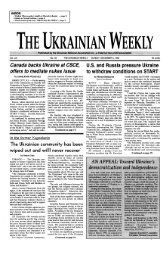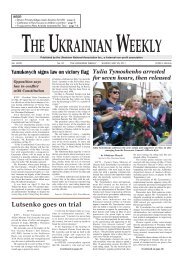ukraine? - The Ukrainian Weekly
ukraine? - The Ukrainian Weekly
ukraine? - The Ukrainian Weekly
You also want an ePaper? Increase the reach of your titles
YUMPU automatically turns print PDFs into web optimized ePapers that Google loves.
6 THE UKRAINIAN WEEKLY SUNDAY, SEPTEMBER 20, 1998No. 38THE UKRAINIAN WEEKLYLooking to 2020 – and beyondIt’s almost a year since <strong>The</strong> Washington Group’s 1997 Leadership Conference,which, unlike previous conferences that focused on international affairs, U.S-Ukraine relations, developments in Ukraine, etc., attempted to peer into our<strong>Ukrainian</strong> American community. Its topic: “We Can Do Better: ExpandingHorizons for <strong>Ukrainian</strong> Americans”; its focus: what’s happening inside our<strong>Ukrainian</strong> American community and what we can learn from other ethnic groups’experiences. It was probably the first national conference in the United States inrecent memory that focused on us here, that is, on <strong>Ukrainian</strong>s in America.It also marked the beginning of a new trend among our professionals – the generationthat should be taking the lead in our community organizations – who arenow examining how our community functions with an eye toward continuing itsviability into the next century. Last year’s TWG conference was just a start. At thatconference it was announced that this October, in place of the usual Columbus Dayweekend Leadership Conference, there would be a special conference in NewJersey on the theme “Will there be a <strong>Ukrainian</strong> community in North America in theyear 2020 – and does it matter?”As Dr. Bohdan Vitvitsky explained during one of the TWG conference panels,“Our parents were involuntary ethnics – they couldn’t be anything else – but wehave a choice: we can assimilate. We are voluntary ethnics.” Thus, Dr. Vitvitsky’sorganization, the <strong>Ukrainian</strong> American Professionals and BusinesspersonsAssociation of New York and New Jersey, announced it would sponsor a conferencedevoted to that topic.During the weekend of October 10-11 in East Hanover, N.J., “<strong>The</strong> Year 2020Conference” will attempt to provide answers to essential questions such as: Doesan independent Ukraine enrich and invigorate the diaspora, or undermine its raisond’être? Will the “Fourth Wave” of immigrants from Ukraine play a key role in thefuture of our community? Are the future of the <strong>Ukrainian</strong> Canadian and <strong>Ukrainian</strong>American communities connected, or will their paths diverge due to different circumstances?In addition, the gathering will offer a forum for the views of theyounger generation (defined as those between the ages of 20 and 35) and the perspectivesof the “mid-life generation.”As the panelists come from a variety of fields – including law, journalism, banking,music, sociology, psychology, history, theology and architecture – and areinvolved in <strong>Ukrainian</strong> community life in diverse capacities, the perspectives theywill offer promise to be distinct. And, hopefully, the discussion they elicit will bestimulating and illuminating – beneficial to the community as a whole. <strong>The</strong> furtherhope is that the conference will attract diverse participants, too – people who willcome with an open mind, ready to share their ideas with fellow <strong>Ukrainian</strong>s andthen take the valuable insights gained at the conference back home to share withfellow activists. In a perfect world, of course, they could then implement the ideasand suggestions presented and show that, indeed, we can do better and we willexist in the year 2020 and beyond.We commend the UAPBA of New York/New Jersey for its initiative in sponsoringthis conference as a manifestation of its profound concern about the future ofour community. And we encourage community members to attend and to participatein the “<strong>The</strong> Year 2020 Conference.” Dear Readers, we now stand at thethreshold of the 21st century. Are we prepared to do what is needed to ensure ourcommunity’s existence into that century?Sept.25Turning the pages back...1066 Among the more famous Varangians (Vikings) with whomthe history of Rus’-Ukraine is associated was Harald IIIHardraade (the Ruthless), a man who seemingly left a mark,whether negative or positive, on the most far-flung places of the European continent.This was not an easy thing to do in the Middle Ages, when transportation was achievedat a pace far more considered than today’s red-eyed variety.At any rate, Harald was born in Norway to King Sigurd in 1015, although the exactplace and date are unknown. In 1030, the Norwegians lost the Battle of Stiklestad tothe Danes, and Harald was forced to flee to Rus’. He joined the Varangian guard ofYaroslav Mudryi (the Wise) and later married his daughter, Yelysaveta Yaroslavna.Some of Harald’s poetry has survived, including a song to this Riurykide princess,which has been translated into <strong>Ukrainian</strong> by Ivan Franko. A saga about his adventureswas also composed, which historian Mykhailo Hrushevsky mentions for its similaritiesto the Primary Chronicle of Rus’.In 1035, Harald travelled to Constantinople and became the head of the Varangianguard of Emperor Michael IV Paleologus, and after 10 years of service returned toNorway, by way of Rus’ and Sweden, to claim his crown.For the first two years Harald shared the throne with his nephew Magnus I, butthereafter he ruled alone and harshly, earning his sobriquet by dealing mercilessly withlocal Norwegian chieftains who challenged his authority.Harald further ensured his place in history when, in the early autumn of 1066, hemade good on a pact with William of Normandy and invaded northern England. KingHarold II, just eight months on the throne in Albion, raced up to meet the Norwegiansnear Stamfordbridge on the Humber, and in the ensuing battle, on September 25, 1066,Harald III was killed and his troops routed.Three weeks later, Harold II’s exhausted troops arrived at Hastings, forced to use theday’s means of overland transport to reach England’s southern coast, some 180 milesfrom the place where Harald III died. Thus, William became known as the Conqueror.Sources: “Harald III,” “Yelysaveta Yaroslavna,” Encyclopedia of Ukraine, Vols. 2, 5(Toronto: University of Toronto Press, 1993); Mykhailo Hrushevsky, History of Ukraine-Rus’,Vol. 1 (Toronto: CIUS Press, 1997); Morris Bishop, “1066,” Horizon, Autumn 1966.On the eve of the UCC congressNational Agenda for the futurePublished below is the draft of a proposed“National Agenda for the <strong>Ukrainian</strong>Canadian Congress, 1998-2001” whichhas been submitted for discussion purposesby the UCC’s Ottawa Branch, which isheaded by Oksana Bashuk Hepburn, andwill be presented to the UCC NationalCongress scheduled for October 9-11 inWinnipeg.<strong>The</strong> proposal is printed here as part of<strong>The</strong> <strong>Ukrainian</strong> <strong>Weekly</strong>’s commitment tocontinuing discussion about the future ofthe <strong>Ukrainian</strong> diaspora.Introduction<strong>The</strong> <strong>Ukrainian</strong> Canadian Congress(UCC) has been working on behalf of<strong>Ukrainian</strong>s in Canada and abroad sinceWorld War II. It has accomplished much,spearheading the establishment of<strong>Ukrainian</strong>s as a strongly participatory yetdistinctly identifiable group in Canadathrough the development of a serious organizationalbase comprising churches andcommunity centers; political activism; culturalpreservation and promotion; and multiculturalism,to cite but a few examples.<strong>The</strong> UCC also devoted considerable efforttowards the struggle for human rights andUkraine’s independence.In recent years the situation haschanged. <strong>The</strong> levels of immigration andassimilation have eroded the membershipof UCC well as of its constituent members;the generosity that built up the community’sinstitutions and real estate hastrickled off; community centers are underutilized;the influence that existed withpeople like former Governor General andMinister Ray Hnatyshyn, former Memberof Parliament and Minister DonMazankowski and the late Supreme CourtJustice John Sopinka has diminished. <strong>The</strong>list goes on.At the same time, Ukraine’s independenceprovides <strong>Ukrainian</strong>s in the diasporawith new strength and support – the likesof which has never been seen by the community.Still, Ukraine is seeking assistancein its difficult transition period and its newimmigrants are looking for differentaccommodations from their fellow<strong>Ukrainian</strong> Canadians and, thus, a new trustfrom the UCC.And they are not the only ones. Withless than 50 percent of the 1 million<strong>Ukrainian</strong> Canadians registered in<strong>Ukrainian</strong> institutions, with a decrease inthe number of persons identifying<strong>Ukrainian</strong> as their mother tongue from309,890 in 1971 to 174,830 in 1996(1996 Canadian Census), with the membershipof the “Big Six” [<strong>Ukrainian</strong>Catholic Brotherhood of Canada,<strong>Ukrainian</strong> Self-Reliance League ofCanada, League of <strong>Ukrainian</strong>s inCanada, <strong>Ukrainian</strong> National Federationof Canada, <strong>Ukrainian</strong> CanadianProfessional and Business Federationand Council of <strong>Ukrainian</strong> Credit Unionsof Canada] in the UCC down considerablyfrom their former numbers, there is aproblem seeking a solution. Similarly,these “left out” peripheral <strong>Ukrainian</strong>Canadians, i.e., the large majority that hasopted out of membership yet still appearsto have considerable interest in its roots,are in need of a clear and relevant agendafrom the UCC if they are to opt back in.This new reality, of which only a smallpart has been raised here, calls on the UCCto develop new strategies in support of itslongstanding, yet timeless, priorities in amanner that will contribute to the lives of<strong>Ukrainian</strong> Canadians and assist the effortsof good Canada-Ukraine relations. Indoing both, the UCC will build up andstrengthen its team and the various member-institutionswith the “new blood” thatwill be required to think and work in anew way. To make progress, the UCCneeds to put forward a clear vision of whatit wants to work at and achieve. It needs tochallenge the people it represents andwishes to lead with a new agenda.<strong>The</strong> purpose of this “Proposed NationalAgenda for the UCC” is to put forward forconsideration by the UCC NationalCongress some ideas that can be agreed toand realized by the next executive.National Agenda priorities<strong>The</strong> UCC National Agenda is based onseveral longstanding UCC priorities.<strong>The</strong>se include, among others, and lead toactivities that:1. enhance the lives of <strong>Ukrainian</strong>Canadians;2. build good Canada-Ukraine relations;3. strengthen UCC and member organizationsthrough inclusion and outreach.Agenda plans and programsIn order to translate the priorities intoconcrete activities with measurable results,the UCC headquarters will make operationalthe priorities by converting theminto plans and programs of action for thenext three years along the following lines.Enhancing the livesof <strong>Ukrainian</strong> CanadiansCanadians of <strong>Ukrainian</strong> descent areproud to be Canadians and are, in themain, pleased with the rights and benefitsaccorded them in Canada. However,enchancing citizenship is an ongoing issuerequiring constant vigilance and action. Tothat end, the UCC will:• examine the various laws, policies andprograms of the federal government thatare less favorable to Canadians of<strong>Ukrainian</strong> descent to ensure <strong>Ukrainian</strong>Canadian citizens justice, equality andappropriate representation in all aspects ofCanada’s life seeking a best-practicesmodel from the British and French experiencein Canada (attention will be paid,among others, to the potential discriminationunder the Canadian Human Rightslegislation, the issue of deportation anddenaturalization, access and representationto promotions and appointments throughoutthe federal jurisdiction to reflect the<strong>Ukrainian</strong> presence, and participation inthe Genocide Museum initiative);• ensure full recognition of the multiculturalnature of Canada, and seek participationin developing appropriate policies andprograms;• work with both governments,Canadian and <strong>Ukrainian</strong>, to develop aviable immigration model.Canada-Ukraine relations<strong>The</strong> UCC will build on the “specialrelationship” model that has defined thelast seven years of Canada’s relations withUkraine. Given the limited progress insome areas, trade in particular, there is aneed for a new framework or “specialalliance,” to give it a fresh name, to guidethe next few years of working together. Todevelop and operationalize this specialalliance, the UCC will:• work to influence the government ofCanada to upgrade its relationship withUkraine, moving it to the level accorded tothe Commonwealth and Francophonie;• capitalize on the success achieved byCanada in helping to position Ukraine inthe global military arena (NATO) andwork with both governments to echo thissuccess in the political and economic arenas;• seek an approach that will allowCanada to represent Ukraine’s interests at(Continued on page 15)

















